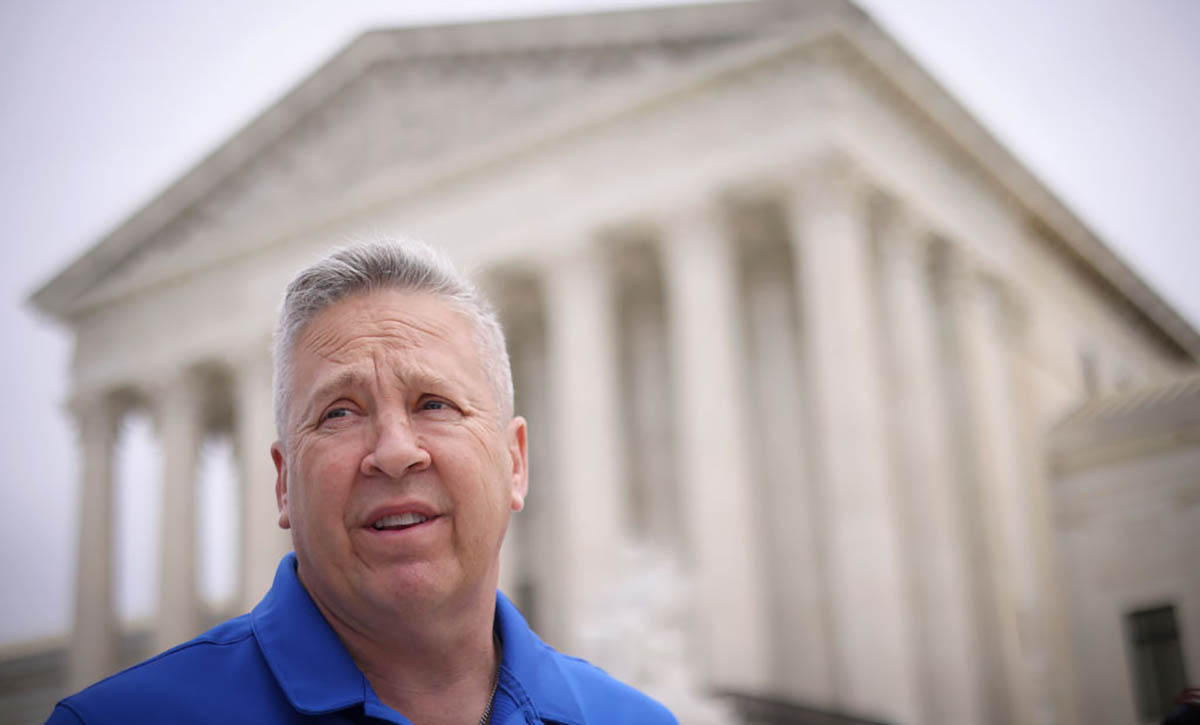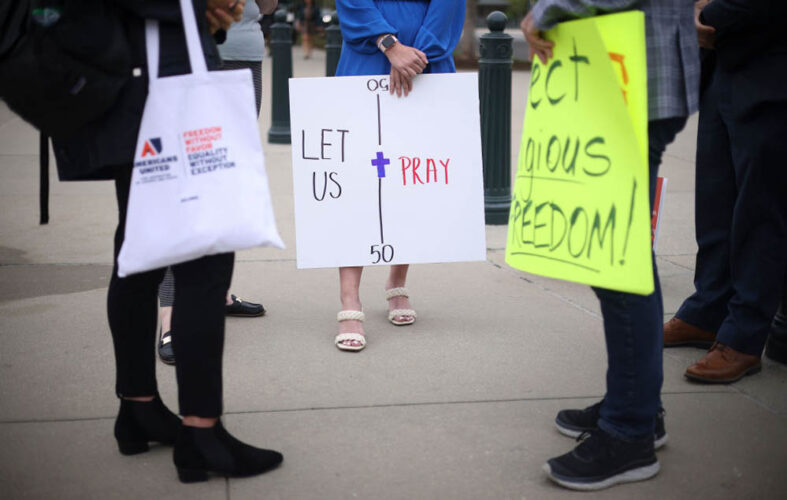Supreme Court Backs School Coach Who Prayed on 50-Yard Line After Football Games
A 6-3 conservative majority once again widens the sphere for acceptable religious expression in public spaces

Get stories like this delivered straight to your inbox. Sign up for The 74 Newsletter
The Supreme Court on Monday widened the scope for religious expression in public facilities, ruling that a high school football coach should have been granted permission to pray on the field after games.
The Court’s ascendant conservative majority, which has proven increasingly friendly to petitions concerning religious freedom over the last few years, delivered a 6-3 decision in Kennedy v. Bremerton, one of the last to be determined in the 2022 term. The case stretched back to 2015, when conflict first arose between the coach, Joseph Kennedy, and the leadership of the Washington State public high school where he worked.
After an escalating disagreement over Kennedy’s practice of post-game prayer — and whether observers would assume it constituted a government endorsement of religion — he was placed on administrative leave and given a poor professional evaluation. He subsequently left the job.
In a lengthy opinion, Justice Neil Gorsuch argued that the school’s actions violated Kennedy’s First Amendment rights, likening his postgame ritual to the protected actions taken by classroom teachers when donning a Muslim headscarf or praying silently before lunch in a cafeteria.
“Here, a government entity sought to punish an individual for engaging in a brief, quiet, personal religious observance doubly protected by the Free Exercise and Free Speech Clauses of the First Amendment,” Gorsuch wrote. “The Constitution neither mandates nor tolerates that kind of discrimination.”

While addressing a relatively narrow corridor of First Amendment jurisprudence — the case doesn’t deal directly with officially mandated prayer in educational settings, or even academically related functions like graduations — Kennedy will likely change the way school districts and other public authorities approach public acts of faith. Specifically, the ruling signals a willingness to reconsider the balance between the Constitution’s Establishment Clause (barring the establishment of a state religion) and the Free Exercise Clause (prohibiting the government from interfering in religious practice).
In a move that appeared telegraphed during oral arguments in April, the majority effectively sidelined the so-called Lemon test, a three-part rubric for determining whether a particular government action subverts the Establishment Clause. Derived from the 1971 Lemon v. Kurtzman case, the rule held that those acts must serve some secular purpose; that they neither promote nor encumber religion; and that they not foster “excessive entanglement” between government and religion.
Dismissing the test, Gorsuch said that the Supreme Court had long since abandoned its “abstract and ahistorical approach to the Establishment Clause.”
Joshua Dunn, a political scientist at the University of Colorado Colorado Springs, said that in the wake of the ruling, public schools “will have a more difficult time claiming that the speech of employees is part of their official duties and thus subject to government control.”
“The most important result of today’s opinion is that it completely lays to rest the Lemon test,” Dunn wrote in an email. “The vast majority of cases where [this test was] applied involved public education. Instead, the court said that judicial application of the Establishment Clause should be guided [by] the clause’s historical understanding and application. Schools and school districts will certainly have more flexibility in accommodating religious expression after today.”
Writing for the Court’s liberal minority, Justice Sonia Sotomayor characterized the plaintiff’s actions as anything but quiet and personal, citing multiple photos of football players joining their coach in prayer. To call Kennedy a private actor, even as he held a public role and prayed in an open venue, was to “misconstrue the facts,” she argued.
“The record reveals that Kennedy had a longstanding practice of conducting demonstrative prayers on the 50-yard line of the football field,” wrote Sotomayor. “Kennedy consistently invited others to join his prayers and for years led student athletes in prayer at the same time and location. The Court ignores this history.”
The decision is only the latest in which conservative members of the Court cautioned local governments to more stringently avoid what they characterized as discrimination against religion. Last week, the same 6-3 majority struck down a Maine statute barring parochial schools from accepting public funding. That ruling, and several others preceding it, have led some legal experts to wonder if further blurring of the public and religious spheres is still to come.
The full spectrum of religious activity across the nation’s 130,000 public schools, whether led by students or staff, is difficult to know for certain. In a 2019 survey conducted by the Pew Research Center, roughly four-in-ten American teenagers said they regularly witnessed prayers held before sporting events. About six-in-ten respondents said they saw prayers occur before lunch.
Rachel Laser, president of the group Americans United for Separation of Church and State, which represented the Bremerton school board in the case, said the ruling represented “the greatest loss of religious freedom in our country in generations.”
“Today, the court continued its assault on church-state separation, by falsely describing coercive prayer as ‘personal’ and stopping public schools from protecting their students’ religious freedom,” she said. “It is no coincidence that the erosion of the line between church and state has come alongside devastating losses on so many of the rights we cherish.”
Get stories like these delivered straight to your inbox. Sign up for The 74 Newsletter

;)
